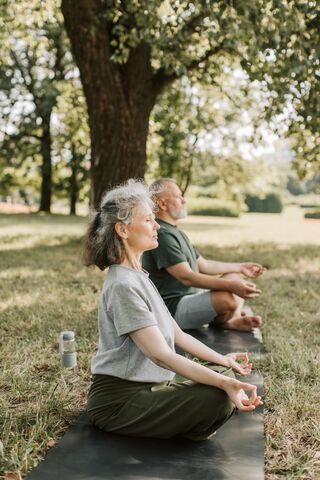Meditation
Kindness Meditation May Slow Biological Aging
New research finds that loving-kindness meditation can slow aging.
Posted June 24, 2019 Reviewed by Gary Drevitch

New research published in Psychoneuroendocrinology has found that practicing loving-kindness meditation, which focuses on compassion, could slow down biological aging.
Biological aging can be measured by looking at the length of a section of DNA called telomeres. Telomeres are the ends of chromosomes that act like the plastic ends of shoelaces to prevent the unraveling and deterioration of the chromosome. As we age, telomere length shortens.
Researchers measured telomere length in 142 adults two weeks before and three weeks after they participated in the meditation for six weeks. Meditation workshops were held weekly as hour-long group meditation sessions. Participants also were given a 20-minute, audio-recorded, guided meditation for daily practice at home as well.
The study found that people who did loving-kindness meditation had significantly less shortening of telomeres in the same amount of time compared both to people who did not meditate and those who did mindfulness meditation. This suggests that loving-kindness meditation, which encourages compassion toward oneself and others, is particularly helpful in protecting against biological aging.
Mindfulness meditation is a kind of focused awareness meditation. Mindfulness meditation trains the mind to develop an open, non-judgmental attention toward the body and breath and any thoughts or feelings that may come and go. This type of meditation has many benefits for improving mood and reducing anxiety and depression, but it did not have an impact on telomere length in this particular study.
Loving-kindness meditation encourages one to feel compassion toward oneself and others. You can try this at home on your own or find guided meditations online that last 10-20 minutes.

Loving-Kindness Meditation
Try 10 minutes of a loving-kindness meditation every morning before you start the day or as a way to wind down at the end of the evening.
- Start in a comfortable seat with your feet flat on the floor and your spine reaching tall toward the ceiling.
- Keep your eyes closed if that feels comfortable and try to relax your entire body.
- Your hands can rest gently in your lap, or you have the option to place one hand on your heart and the other on your abdomen. (If sitting feels uncomfortable, you can do this exercise while lying down. You may like placing one hand on your heart and the other on your abdomen.)
- Take a deep breath in and out as you settle your mind and body.
Receiving Kindness
- Think of someone who is close to you, who cares for you deeply. Imagine that person is to your right and is sending you love. Feel the warmth of this kindness.
- Think of another person who loves you and imagine them to your left. Feel the warmth of the kindness from that person.
- Now imagine that you are surrounded by all the people who love you. Feel the warmth of their love for you.
Sending Kindness
- Imagine that you see a loved one sitting across from you. Focus on sending that person love and warmth. Feel the connection that this person wishes to be loved and happy as well. Repeat this phrase in your mind silently: May you be safe, may you be healthy, may you be free from suffering.
- Now, imagine an acquaintance toward whom you feel neutrally sitting across from you. Feel the connection. Repeat the phrase in your mind silently: May you be safe, may you be healthy, may you be free from suffering.
- Now, expand this sense of love and warmth, and imagine that you can emanate this feeling toward all living beings around you. Repeat the phrase in your mind silently: May all beings be safe, may all be healthy, may all be free from suffering.
Find more meditation tips in our book, The Harvard Medical School Guide to Yoga.
Copyright © 2019 Marlynn Wei, MD
Facebook image: Potstock/Shutterstock
LinkedIn image: Elvira Koneva/Shutterstock


